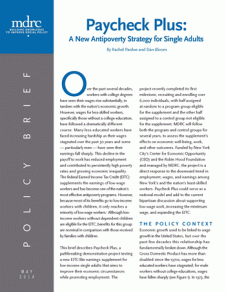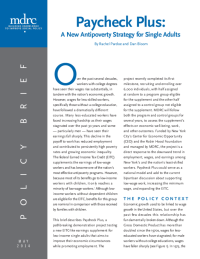Paycheck Plus
A New Antipoverty Strategy for Single Adults

Over the past several decades, workers with college degrees have seen their wages rise substantially, in tandem with the nation’s economic growth. However, wages for less-skilled workers, specifically those without a college education, have followed a dramatically different course. Many less-educated workers have faced increasing hardship as their wages stagnated over the past 30 years and some — particularly men — have seen their earnings fall sharply. This decline in the payoff to work has reduced employment and contributed to persistently high poverty rates and growing economic inequality. The federal Earned Income Tax Credit (EITC) supplements the earnings of low-wage workers and has become one of the nation’s most effective antipoverty programs. However, because most of its benefits go to low-income workers with children, it only reaches a minority of low-wage workers. Although low-income workers without dependent children are eligible for the EITC, benefits for this group are nominal in comparison with those received by families with children.
This brief describes Paycheck Plus, a pathbreaking demonstration project testing a new EITC-like earnings supplement for low-income single adults that aims to improve their economic circumstances while promoting employment. The project recently completed its first milestone, recruiting and enrolling over 6,000 individuals, with half assigned at random to a program group eligible for the supplement and the other half assigned to a control group not eligible for the supplement. MDRC will follow both the program and control groups for several years, to assess the supplement’s effects on economic well-being, work, and other outcomes. Funded by New York City’s Center for Economic Opportunity (CEO) and the Robin Hood Foundation and managed by MDRC, the project is a direct response to the downward trend in employment, wages, and earnings among New York’s and the nation’s least-skilled workers. Paycheck Plus could serve as a national model and add to the current bipartisan discussion about supporting low-wage work, increasing the minimum wage, and expanding the EITC.






